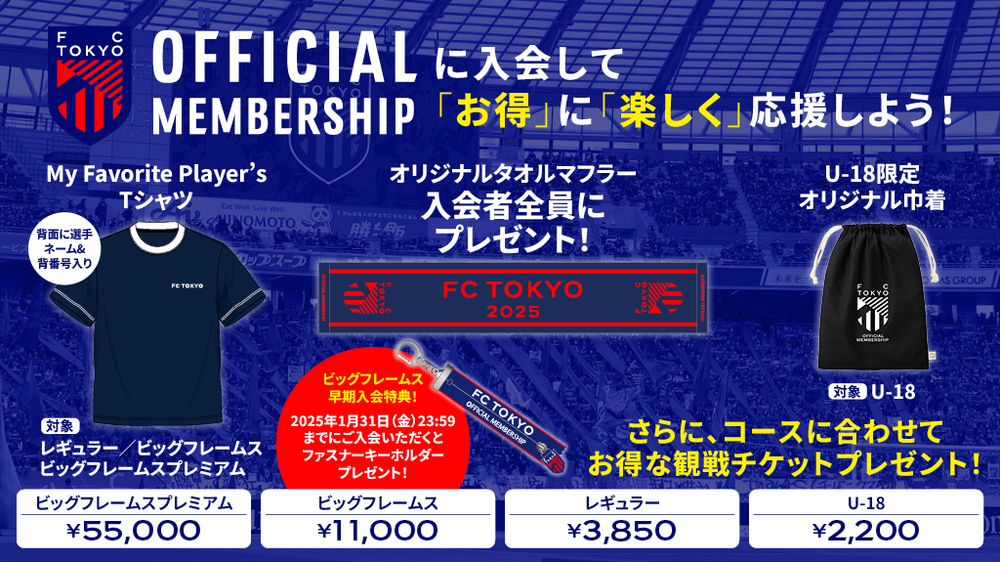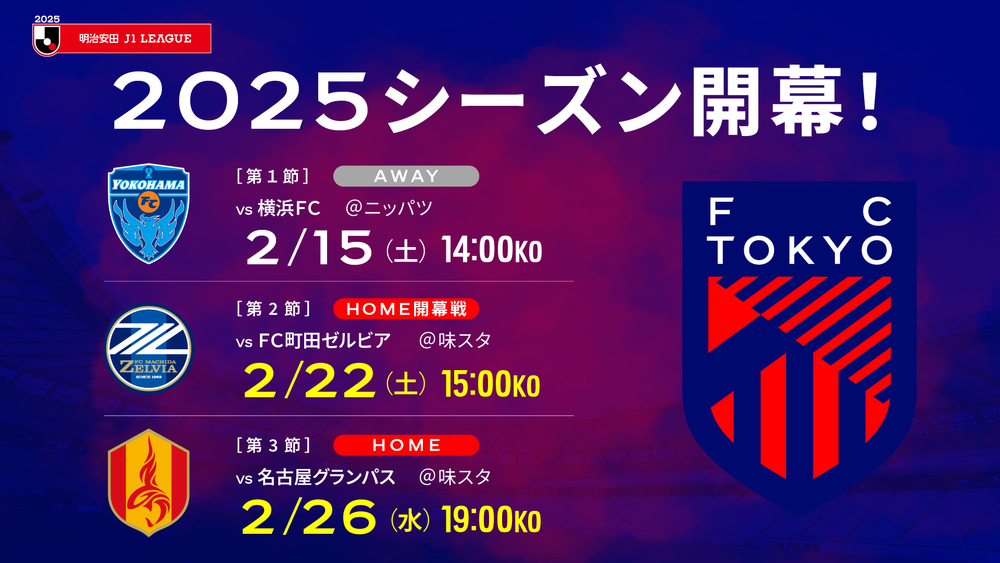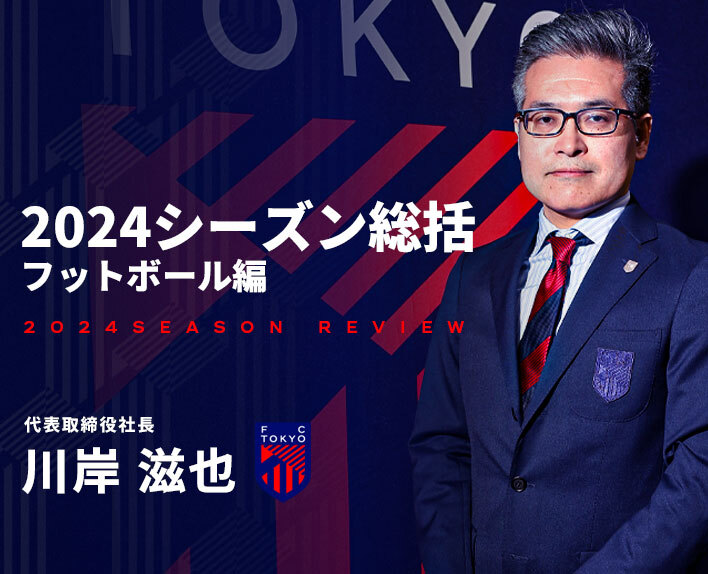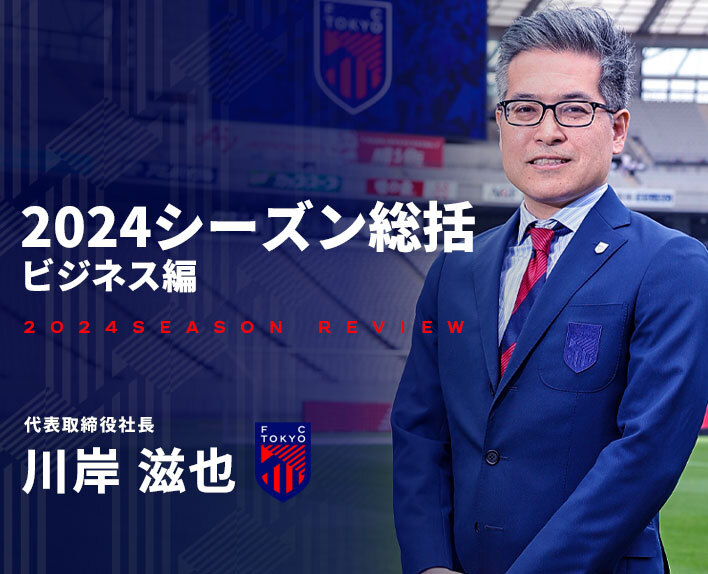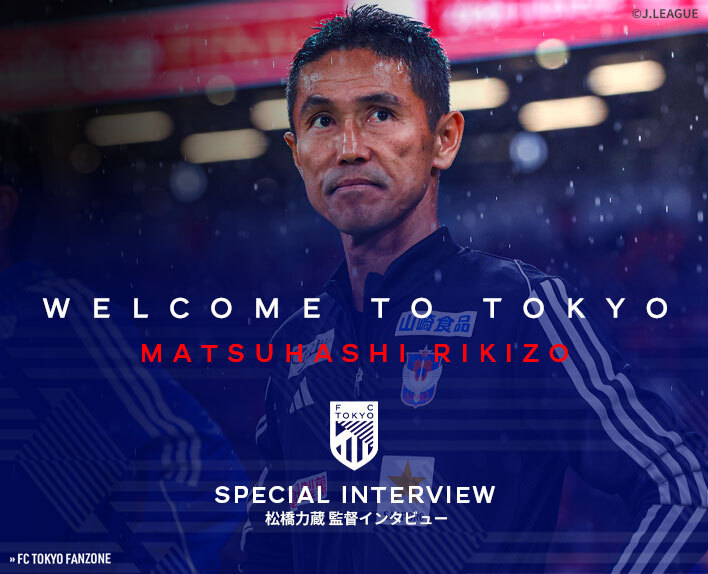FC Tokyo finished the 2024 season. While it was a year that saw numerous record-breaking figures in business aspects such as average attendance and annual revenue, the team also faced the reality of not being able to compete for titles. We interviewed President Shigeya Kawagishi to reflect on the year’s battles from both business and football perspectives regarding the club's current position. Following the first part that touched on the strong business side, the second part focuses on the football perspective. Despite improvements in league standings and goals compared to last season, how do we perceive the reasons for not being able to break into the true upper echelon, and what direction are we aiming to move towards?
Interview and Composition = Kei Sato (Freelance Writer)
To increase the probability of victory
──President Kawagishi has previously mentioned that "a soccer club is a business and football are two wheels that turn together." From here, I would like to ask about the football aspect. First, please share your honest thoughts on the performance for the 2024 season.
First of all, I always want to be in the title race, but I was unable to reach that goal. To be honest, it's frustrating. The league result was 7th, which is an improvement of 4 places from 11th in the 2023 season. However, we were significantly behind Vissel Kobe, who won the championship, and there was a 10-point gap to the elite qualification zone for the AFC Champions League. Among the three J1 clubs based in Tokyo, we finished in the lowest position, settling into a much more subdued position than the one we envisioned at the beginning of the season. We were also eliminated early in the J.League YBC Levain Cup and the Emperor's Cup. There are still many things we need to do, and I feel that there are many things we are lacking this season.
──Will the success in the business aspect be utilized in the football aspect from now on?
To begin with, I believe that we cannot significantly change the football aspect from a business perspective. The direction of the arrow is to improve the content of football first, and then consider how to develop that into a business. Additionally, it is a cycle of reinvesting the results from the business back into football.
From our perspective, when I took office, due to the COVID-19 pandemic, it was necessary to work on restructuring and improving the business side, so we started from there. However, to get into a good cycle, we need to switch on the football side; otherwise, we cannot enter that cycle. Therefore, I am currently focusing on that and want to work on it. This was also what I discussed in the last interview. However, at this point, I must honestly say that it has not yet become the picture I envisioned. As a club, I believe we must fully commit to that and pursue results.
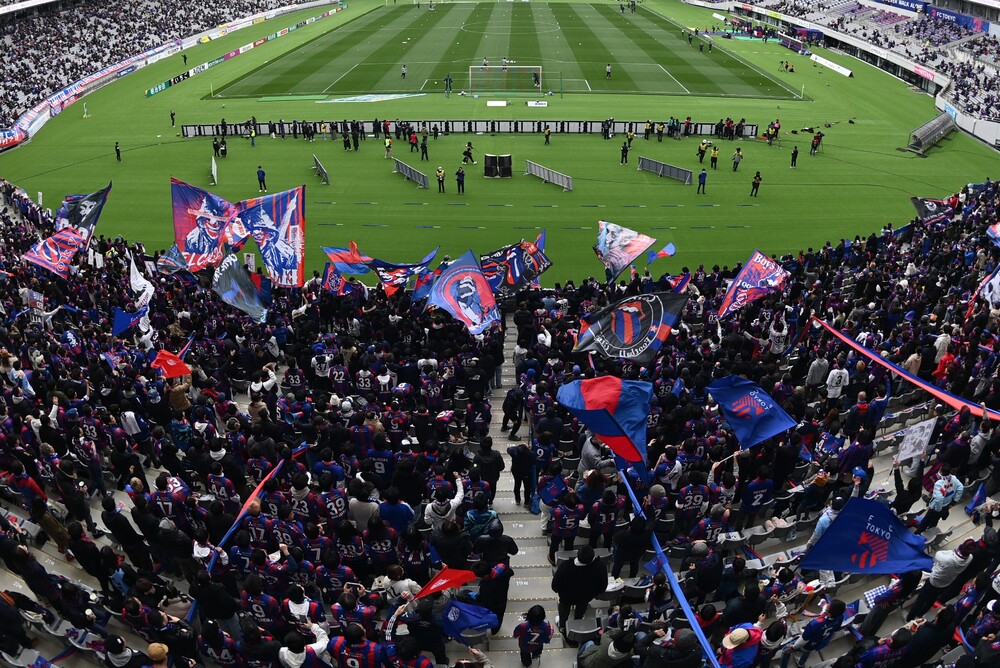
──How far have we progressed in preparing to enter the cycle of reinvestment from the business side to the football side in the three years since you became president?
I took over in the 2022 season. Amid the pandemic, with declining sales, it was a challenge to allocate a budget for football, including personnel costs. This was not just the case for FC Tokyo, but it was certainly a very difficult situation. I believe it can be said that we were always walking a tightrope. In that regard, my predecessor, Chairman Naoki Okane, also faced significant struggles. Under such circumstances, we managed to navigate through without drastically cutting the football budget, and we are gradually increasing the budget as we move forward.
Of course, there are always costs in business, so we cannot invest all of the increased revenue into football, but we are definitely reinvesting the profits. This applies not only to the top team but also includes the academy, and we have just started to use the profits for the overall football aspect.
That said, as stated in 'FC Tokyo VISION 2030', many may feel that the current season's performance is insufficient to instill the image of Tokyo as FC Tokyo. In particular, there may be fans and supporters who are shocked to have fallen behind the newly promoted teams, FC Machida Zelvia (3rd) and Verdy (6th).
That's right. I also declared at the new system announcement event that "Tokyo is blue and red" and approached the season with that mindset. However, I couldn't make it happen, and I always have the feeling that we must be number one among the three clubs in Tokyo. As FC Tokyo, which has been in J1 for a long time, I had that pride and wanted to prove it with results. I strongly feel that we cannot continue like this.
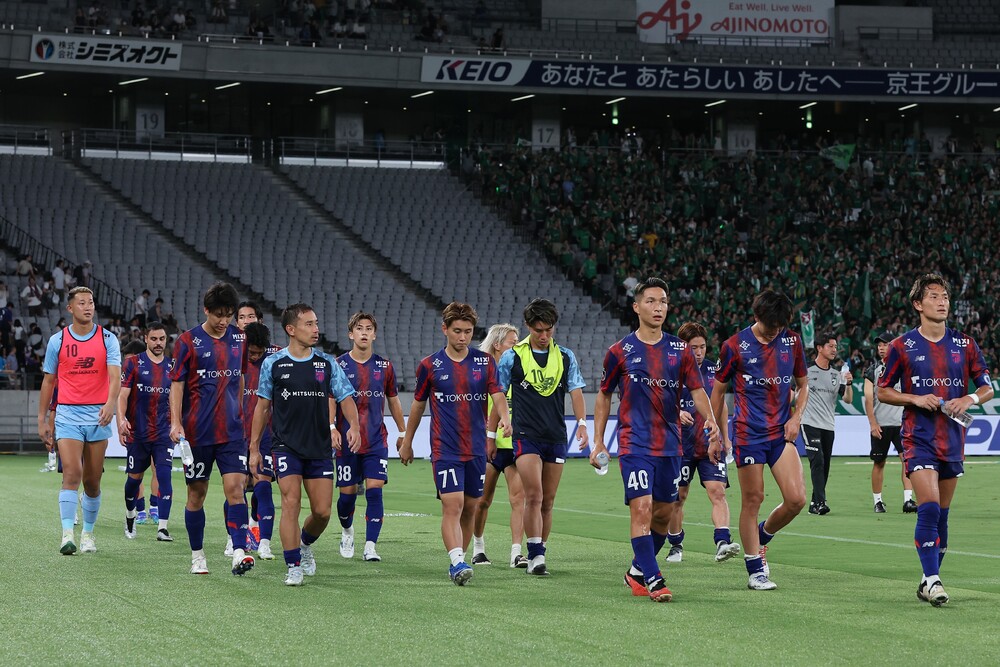
──What do you think is the reason for this result?
It simply means we lost in football. Of course, if you look closely at the numbers, there are both good and bad aspects, so it's not a simple story. We have moved up from 11th to 7th place, and our points have increased. The number of goals scored has also improved. The average goals per match is 1.39, which is the highest since the 2013 season led by Ranko POPOVIC. We might say that we have taken a step forward in realizing our goal of "+1 Goal".
However, on the other hand, we were unable to reduce the number of goals conceded. With an average of 1.34 goals, it was a tough number to compete with the top teams. The average goals conceded by the top teams is around 1.0. There is a significant gap there. Although we scored more goals than last season, we also conceded many, which prevented us from advancing to the top ranks. Additionally, the gap with expected goals was also identified as an issue.
──Could you explain in detail?
Simply put, the expected goals represent how many chances there were to score. There seem to be various calculation methods, but according to Data Stadium, FC Tokyo's expected goals were 1.21. In contrast, the average number of goals scored per match was 1.39, indicating that they were efficient in scoring. They often converted their limited chances. The expected goals are calculated based on combinations of the number of shots and where they were taken, and a low value means that there were many low-probability shots. Ultimately, while the number of goals increased, it may have given the impression that they weren't getting close to the goal or that there were few chances.
It is often said that over a long season or with each repeating season, the expected goals and the actual number of goals tend to be quite close. This season, the number of goals has increased compared to last season, so it was good to score efficiently, but I also believe that this is not something that can be replicated every season.
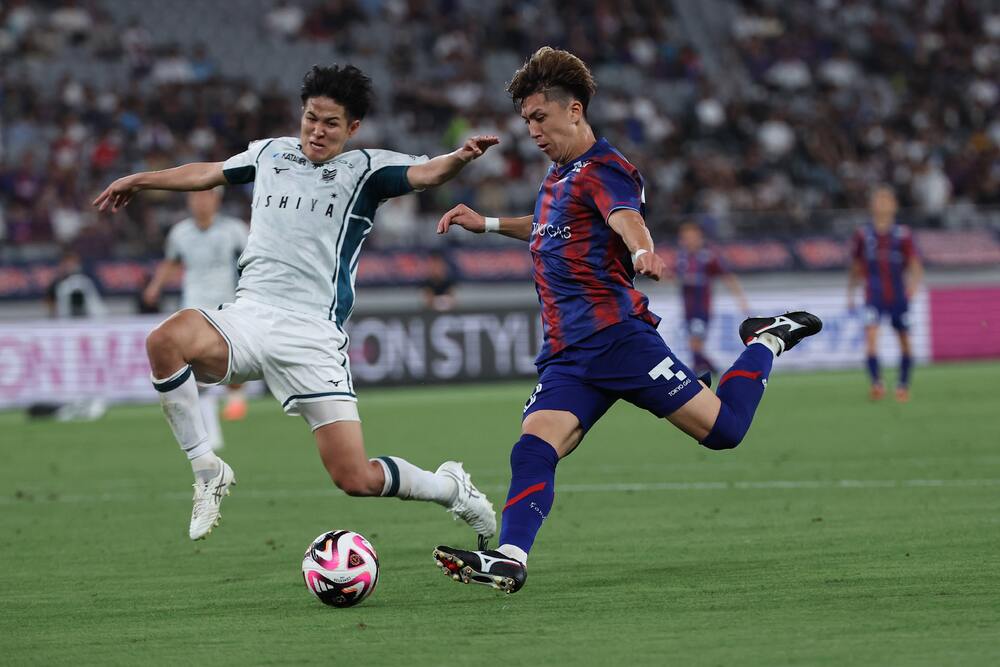
──In that case, should the direction of team building aim to improve the expected goals?
That's right. It's something we share within the club. If we don't increase our goal expectations, we won't continue to score. Looking at the top clubs for the 2024 season, teams like Kobe and Sanfrecce Hiroshima have numbers like 1.6 or 1.8. There is a significant gap compared to us, which means we have fewer scoring opportunities. If we don't improve these numbers, our ranking won't go up either. It's often said that we need to enhance the reproducibility of scoring opportunities, but on the other hand, while there may be similar scenes, it's impossible to recreate exactly the same scene in soccer. In the end, it comes down to a combination of the players' imagination, ideas, and decisiveness. I believe we need to delve deeper into these aspects to raise our goal expectations.
──Rikizo MATSUHASHI has been appointed as the new manager for the upcoming season. Did the new manager select based on such considerations?
The expected goal value is merely a result indicator, so it serves as reference data; however, it is one of the important elements. The previous coach, Peter CKLAMOVSKI, and the one before him, Albert PUIG ORTONEDA, both left very good numbers during their time in the J2 League, with a high goal rate and a low goals conceded rate. However, there are differences in categories and the players involved, and it cannot be solely attributed to the coaches, as it could not be replicated at FC Tokyo. This time, with the appointment of Rikizo MATSUHASHI as the new coach, I explained what the club is looking for, and conversely, I was able to listen to what Matsuhashi-san is thinking, and I believe the sharing went smoothly. What was impressive was the very high resolution of the discussion. The amount of information was also incredibly large.
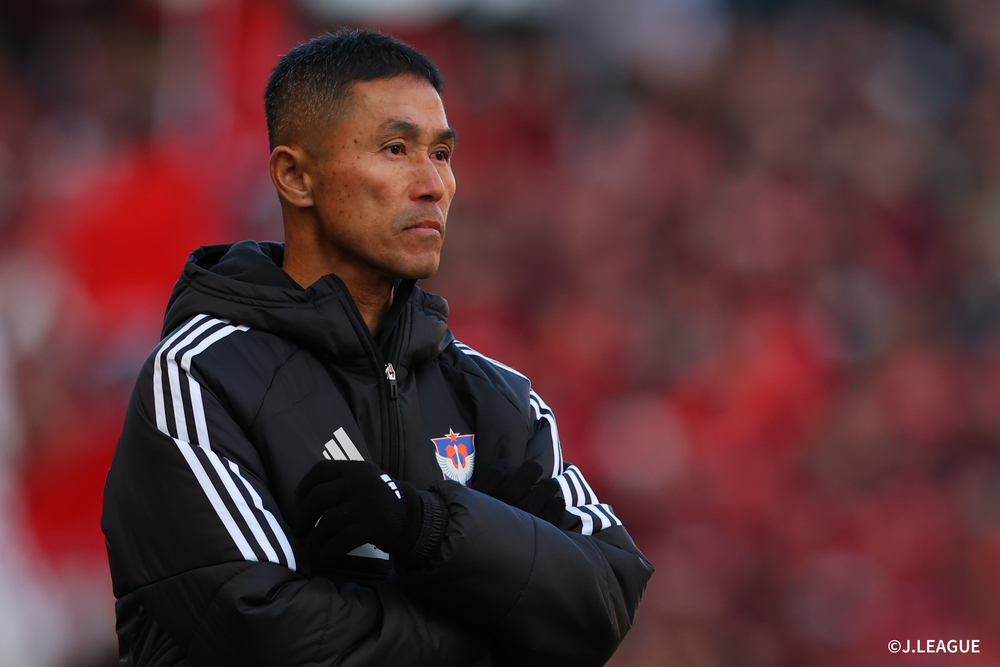
──Please tell us the reason for choosing Coach Matsuhashi among several candidates.
FCTokyo believes that when considering changing the football we aim for, it is extremely important to understand the coach's thoughts on philosophy and how it is implemented within the team, and it is essential to proceed with a shared understanding with the club. Naturally, better communication is preferable for this. Since I became president, I have worked with two foreign coaches, and while various communications have taken place within the club, considering the current situation of the club, I thought that a Japanese coach might be better next. I believe Coach Matsuhashi is suitable in this regard. Since the end of the season and the confirmation of Coach Matsuhashi's appointment, communication and mutual understanding have rapidly progressed.
Our budget scale ranks 7th to 8th in the league. From here, we will work hard to increase our budget in order to improve our ranking. At the same time, I believe it is necessary to compete with a coach who can deliver good performance relative to the budget. Considering that, I think Coach Matsuhashi is one of the best leaders. What impressed me when talking to Coach Matsuhashi was his statement, "In Tokyo, we seek the optimal solution for Tokyo." I believe that mindset is what leads to bringing out the team's performance. I think we will be able to hear the coach's thoughts again at the announcement of the new structure on January 10, 2025, and I hope they will continue to seek the optimal solution and fight.
──Finally, please share your thoughts on the relationship between business and football, Mr. Kawagishi.
Football clubs always face the reality of budget issues. While it may sound dull to talk about, the management side aims to create a budget that allows for flexibility, and the strengthening department's job is to utilize that budget to effectively build the team. Except for the 2019 season, we have generally ranked according to our budget size. In the 2024 season, we finished 7th in the J1 League, and we were unable to perform significantly against our budget. We want to change this and aim to become a strong team that can elevate our management scale. By improving the output of everyone involved in the club, whether it be in selecting a coach, team composition, operations, or management, we want to create a new chemical reaction that transforms the team. I hope that the 2025 season will be a year where we can clearly show you that power.
The first part is here
